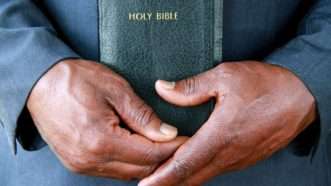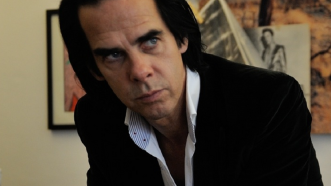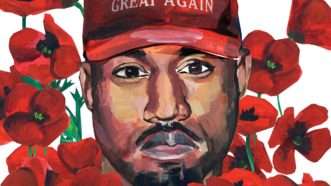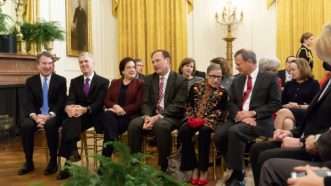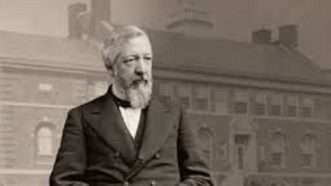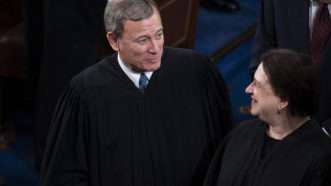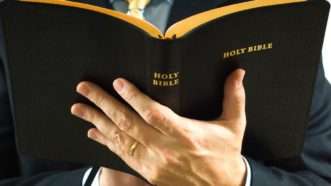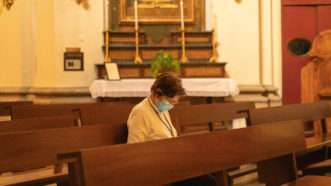Religion
Rocker Nick Cave: Cancel Culture Is 'Bad Religion Run Amuck'
'Political correctness has grown to become the unhappiest religion in the world.'
Kanye West Unveils His Presidential Platform
Is the Kanye 2020 platform designed to steal votes from Joe Biden?
Do Plaintiffs from Conservative Cultural/Religious Groups (e.g., Muslims) Have More Right to Proceed Pseudonymously in Sex Assault Lawsuits?
That's what an Eleventh Circuit opinion seems to suggest, in a case where a Trinidadian Muslim plaintiff said she "come[s] from a strict Muslim household where under [their] cultural beliefs and traditions such a sexual assault would have the tendency to bring shame and humiliation upon [her] family."
Linda Greenhouse Thinks COVID-19 Rules That Favor Casinos Over Churches Raise No Constitutional Issues Worth Considering
The former New York Times SCOTUS reporter does not seem to understand the arguments she is criticizing.
Supreme Court (by 5-4 Vote) Declines to Exempt Nevada Churches from Gathering Size Limits
The dissenting Justices stress that casinos and other establishments are subject to more lenient limits.
Kanye West Launches a Presidential Campaign of Christian Morality
The hip-hop star's wild, disjointed presentation offers both red meat and poison for right, left, and libertarian.
The Obamacare Birth Control Coverage Fight That Never Ends
Plus: Biden echoes Trump on trade, tech ties to cops revealed, and more...
A Big Day for Religious Liberty at the Supreme Court
On the penultimate day of the October 2019 term, the Supreme Court expands the ministerial exception and upholds exemptions to the contraception coverage mandate.
Churches, Which Account for 0.02% of COVID-19 Cases, Are a 'Major Source' of Infection, The New York Times Says
The paper's claim reflects the same arbitrary distinction between religious and secular activities that churches are challenging in court.
Supreme Court Strengthens First Amendment Protections for Religious Employers
SCOTUS rules 7-2 in Our Lady of Guadalupe School v. Morrissey-Berru.
Don't Let the Pandemic Kill Religious Freedom
COVID-19 control measures violate the First Amendment when they arbitrarily favor secular conduct.
Supreme Court Strikes Down Montana Blaine Amendment Barring State Aid to Religious Schools
The decision is an important victory against government discrimination on the basis of religion.
Kneeling in the Church of Social Justice
America certainly has work to do on race, but ritual and symbolic acts aren't the way forward.
New York's Pandemic-Inspired Restrictions on Church and Synagogue Services Are Unconstitutional, a Federal Judge Rules
U.S. District Judge Gary Sharpe finds that the state's COVID-19 control measures arbitrarily discriminate against religious conduct.
N.Y. Officials' Endorsement of Anti-Racism Protests Leads to Successful Religious Freedom Challenge to Gathering Ban
"The City's argument that temporary selective enforcement of the challenged laws with respect to mass race protests is a matter of public safety ... would perhaps be legitimate but for Mayor de Blasio's simultaneous pro-protest/anti-religious gathering messages, which clearly undermine the legitimacy of the proffered reason for what seems to be a clear exemption, no matter the reason."
Peculiar Religious Discrimination
A charter school seeking contractors to provide art instruction can't exclude companies just because their web site has religious references.
The Law Protects Religious Liberty Far More than Many People Think
Conservative legal commentator and experienced religious liberties litigator David French explains why.
Supreme Court's LGBT Discrimination Decision Revives Interest in the Federal Equality Act
The Equality Act would significantly expand government power and it also threatens religious freedom.
John Roberts Does Not Think California's Special Restrictions on Religious Services Discriminate Against Churches
As SCOTUS declines to issue an injunction, the chief justice says the state's COVID-19 control measures seem consistent with the First Amendment.
Supreme Court (by 5-4 Vote) Rejects Free Exercise Clause Objection to California Occupancy Cap for Churches
The cap (25% of capacity or at most 100 people) also generally applies to secular gatherings, but not to various commercial establishments.
Do Pandemic-Inspired Bans on Religious Services Violate the First Amendment? Circuit Courts Are Split.
Supreme Court precedent suggests COVID-19 restrictions that discriminate against churches are presumptively unconstitutional.
Churches Get Go-Ahead in California's Latest Reopening Plans
They’re still not being treated the same as secular places of gathering, so a legal challenge continues.
My Argument for Preserving Employment Division v. Smith
I'd love to hear your thoughts about this draft brief.
Ninth Circuit Rejects Religious Freedom Challenge to California Closure, One Judge Dissents
A short majority opinion, and a long dissent.
Minnesota Churches Aren't Asking the Governor for Permission To Reopen
If the Mall of America can reopen on June 1, why can’t the Cathedral of St. Paul?
Justice Department Warns California Not To Leave Churches Behind in Its Reopening Plans
Allowing schools and malls to reopen, but not places of worship, would raise civil rights issues
Court Suggests That Lockdown Exemptions for Religious Institutions Violate the Establishment Clause,
at least when they specifically target religious institutions, and not similar secular entities.
Stanford Prof. Michael McConnell on "Who Is a 'Minister'?"
Can the Supreme Court draw the line?
Prohibiting Religious Services Makes the First Amendment a Coronavirus Victim
While governments are shutting down religious services and fining pastors who defy those orders.
Islamic Prenuptial Agreements (Mahrs) Are Enforceable by American Courts, Like Other Prenups
So a Maryland appellate court held last month, I think quite correctly (and consistently with the broad trend in other states):
It's 'Access' to Birth Control Versus Employer Beliefs Again at the Supreme Court
The Obamacare contraception mandate continues to cause legal trouble.
Sixth Circuit Temporarily Blocks Kentucky Governor's Limit on Drive-In Church Services
The court concludes that it likely violates the Kentucky Religious Freedom Restoration Act and the Free Exercise Clause, chiefly because the Governor's order has many exceptions for various allowed services.
De Blasio Threatens To Arrest Hasidic Jews for Congregating To Mourn the Death of a Rabbi
On the same day Brooklyn’s Hasidic Jews came out for a funeral, hundreds were gathering elsewhere in New York City to watch a military flyover.
The Attorney General Defends Civil Liberties Against Overreaching COVID-19 Control Measures
While denying Donald Trump's dictatorial impulses, William Barr notes that public health emergencies do not give governments unlimited powers.
Even in a Pandemic, 'Constitutional Rights Still Exist'
A federal judge defended religious freedom by blocking a misguided ban on drive-in Easter services.
Father Can't Be Ordered "to Comply With the Cultural Norms of Hasidic Judaism" During His Visitation Time with Children
So holds a New York appellate court.

